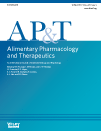 A gastroenterology and hepatology journal has retracted a 2017 review after discovering it included data “accessible only during peer review for another journal.”
A gastroenterology and hepatology journal has retracted a 2017 review after discovering it included data “accessible only during peer review for another journal.”
Although we don’t know the details of this particular case—for instance, how the editors and publisher of Alimentary Pharmacology & Therapeutics learned about the transgression and which author was responsible—the journal acted quickly to retract the paper, which was published online in March.
Here’s the retraction notice for “Systematic review: benefits and harms of transarterial embolisation for treating hepatocellular adenoma:”
The above article from Alimentary Pharmacology & Therapeutics, published online on 20 March 2017 in Wiley OnlineLibrary (www.onlinelibrary.wiley.com) has been retracted by agreement between the Authors, the Editor-in-Chief, R.E. Pounder, and John Wiley & Sons Ltd. The retraction has been agreed due to the inclusion of data accessible only during peer review for another journal.
We’ve covered similar nightmare scenarios where peer reviewers have stolen material from researchers and published the work as their own. In one “deeply disturbing” case, Michael Dansinger of Tufts Medical Center found his rejected paper republished with one of his reviewers listed as a co-author. Dansinger decided to pen a letter to the reviewer in the journal, aptly titled “Dear Plagiarist: A Letter to a Peer Reviewer Who Stole and Published Our Manuscript as His Own,” explaining the ordeal.
For this recent case, we reached out to three of the paper’s authors—corresponding authors Jian-Hong Zhong and Yi-Long Ma as well as last author Le-Qun Li, all from Affiliated Tumor Hospital of Guangxi Medical University in China. We also contacted the publisher and editor-in-chief and will update the post if we hear back.
Hat tip: Rolf Degen
Like Retraction Watch? Consider making a tax-deductible contribution to support our growth. You can also follow us on Twitter, like us on Facebook, add us to your RSS reader, sign up on our homepage for an email every time there’s a new post, or subscribe to our new daily digest. Click here to review our Comments Policy. For a sneak peek at what we’re working on, click here.
Someone’s work was plagiarised. The victim is not named in the report. The victim’s original paper was rejected by the reviewer who plagiarised it?? The victim needs to be protected.
The victim, who was the original “owner” of this work, must be given credit in the retraction notice.